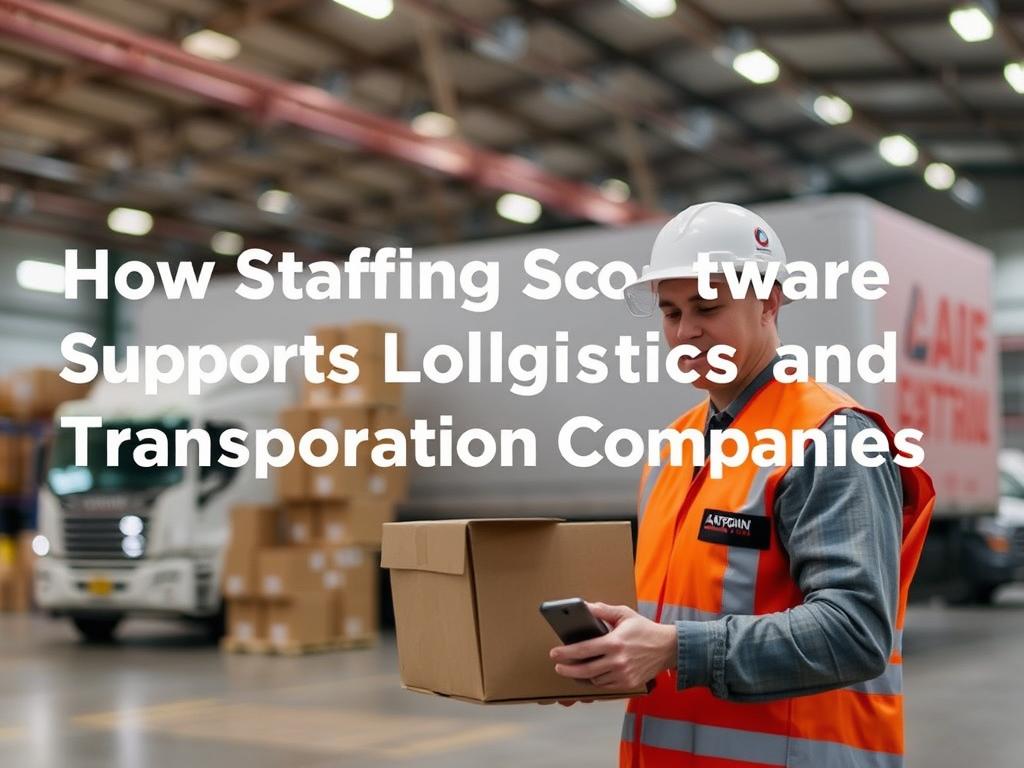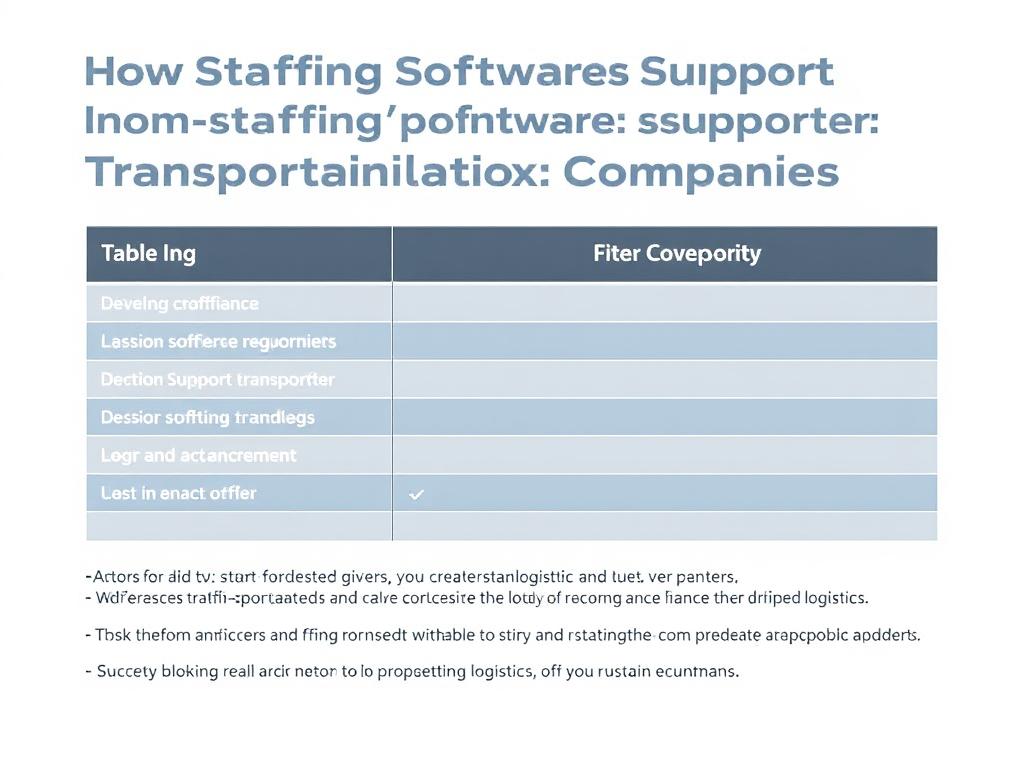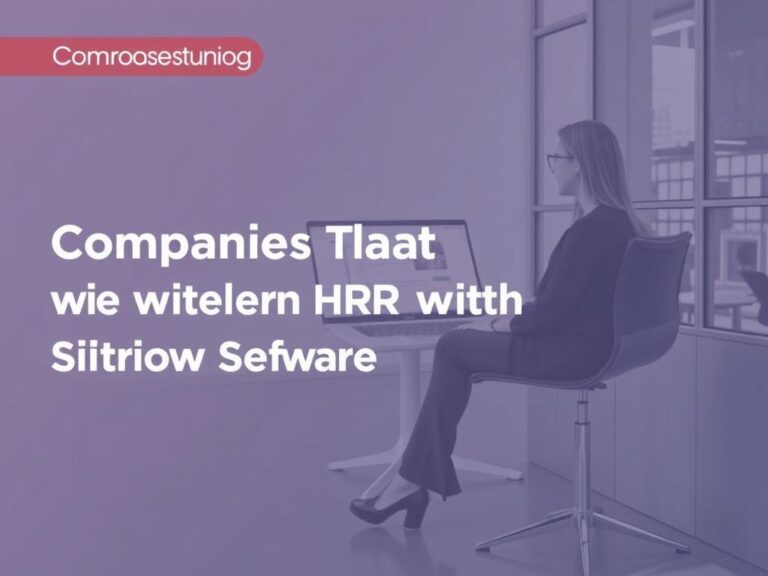How Staffing Software Supports Logistics and Transportation Companies
Logistics and transportation companies operate in a fast-paced, ever-changing environment where managing workforce efficiency is critical to success. With the rise of e-commerce and global trade, these industries face mounting pressure to deliver goods quickly and accurately. This is where staffing software steps in as a game-changer. By streamlining recruitment, scheduling, compliance, and communication, staffing software transforms how logistics firms handle their workforce challenges. Whether it’s managing truck drivers, warehouse staff, or delivery personnel, employing the right staffing solutions can bring significant improvements in productivity and service quality.
One of the biggest challenges logistics and transportation companies face is managing a large and diverse workforce scattered across various locations. Traditional staffing methods often lead to scheduling conflicts, understaffed shifts, or even compliance issues, all of which can disrupt operations. Staffing software helps to centralize workforce management by automating key tasks like job posting, applicant tracking, and schedule coordination. This means companies can fill critical roles faster and ensure that every shift is adequately staffed without manual errors. It also allows managers to assign the right personnel based on certifications, qualifications, or experience, which is crucial in safety-sensitive jobs like truck driving.
Enhancing Recruitment and Hiring Efficiency
Recruitment in logistics and transportation is often a race against time. With fluctuating demand due to seasons, promotions, or economic cycles, companies need to ramp up or scale down their workforce quickly. Staffing software simplifies this process by providing applicant tracking systems (ATS) and automated screening tools that filter out unqualified candidates early on. These tools not only save time but also improve the quality of hires by matching skills and availability to job requirements precisely. For example, a trucking company can instantly identify drivers with the right licenses and clean driving records, speeding up onboarding while maintaining compliance with regulations.
Table: Key Features of Staffing Software for Logistics Companies
| Feature | Benefit | Industry Impact |
|---|---|---|
| Automated Scheduling | Reduces conflicts and manual errors | Ensures optimum coverage for shifts and deliveries |
| Applicant Tracking System (ATS) | Streamlines recruitment and speeds up hiring | Helps meet fluctuating workforce demands quickly |
| Compliance Management Modules | Tracks certifications and labor law compliance | Mitigates risks of violations and fines |
| Mobile Access | Allows staff to check schedules and receive updates on-the-go | Improves communication and reduces no-shows |
Improving Workforce Scheduling and Communication

Scheduling is a complex puzzle in transportation companies, where shifts often span irregular hours and require specific qualifications. Staffing software offers dynamic scheduling tools that can assign shifts based on employee availability, skills, and preferences. This flexibility is critical in managing driver hours to comply with regulations such as Hours of Service (HOS) for truckers. Furthermore, integrated communication features like automated alerts and real-time updates keep employees informed, reducing absenteeism and increasing reliability.
Streamlining Compliance and Safety

Compliance is a non-negotiable in logistics and transportation due to strict government regulations surrounding driver qualifications, vehicle safety, and labor laws. Many staffing software platforms now include compliance modules that automatically monitor certifications, licensing renewals, drug screenings, and mandatory training. This automation helps companies avoid costly penalties and promotes a safer working environment. When safety is prioritized, companies not only protect their workforce but also demonstrate reliability to clients and regulatory bodies alike.
Benefits Beyond Workforce Management
Staffing software also supports operational analytics, providing valuable insights into workforce performance, turnover rates, and labor costs. By analyzing this data, logistics managers can make informed decisions to optimize staff allocation, minimize overtime expenses, and improve retention strategies. This proactive approach leads to smoother operations and enhanced customer satisfaction.
List of Key Advantages of Staffing Software in Logistics and Transportation
- Faster recruitment and reduced time-to-hire
- Efficient scheduling that accommodates dynamic demand
- Improved communication with real-time alerts and messaging
- Automated compliance tracking to meet regulatory standards
- Insightful data analytics to drive workforce optimization
- Mobile accessibility for remote or field employees
Choosing the Right Staffing Software for Your Company
Not all staffing solutions are created equal. When selecting staffing software for a logistics or transportation company, it’s important to look for platforms that offer industry-specific features and can integrate with existing systems such as payroll and route management software. User-friendliness, scalability, and strong customer support are also essential characteristics to consider. Many providers offer customizable modules tailored to the unique scheduling complexities and compliance requirements faced by transportation firms.
Table: Factors to Consider When Selecting Staffing Software

| Factor | Consideration |
|---|---|
| Industry Specialization | Does the software address logistics-specific needs? |
| Integration | Compatible with current payroll and fleet management tools |
| Compliance Features | Supports tracking of licenses, certifications, and training |
| User Interface | Easy for managers and employees to navigate |
| Mobile Functionality | Supports remote access and on-the-go notifications |
| Customer Support | Available for troubleshooting and ongoing training |
Real-World Impact: Success Stories
Leading logistics companies have reported significant operational improvements after implementing staffing software. For instance, some firms have seen a reduction in scheduling conflicts by over 50%, while driver retention rates increased due to better communication and scheduling flexibility. Moreover, compliance modules have helped avoid costly regulatory penalties and have improved overall safety records. These real-world benefits underscore how staffing software is not just a nice-to-have but a critical tool for thriving in the competitive logistics marketplace.
Conclusion
In today’s fast-moving logistics and transportation sectors, staffing software is a vital ally in managing a complex, dispersed workforce efficiently. From streamlining recruitment and scheduling to ensuring compliance and enhancing communication, this technology addresses the industry’s unique challenges head-on. By adopting staffing software, logistics companies can reduce operational disruptions, lower labor costs, and improve employee satisfaction, all while maintaining the highest standards of safety. As competition intensifies and customer expectations rise, leveraging the right staffing tools can be the key to sustained success and growth in the transportation industry.






